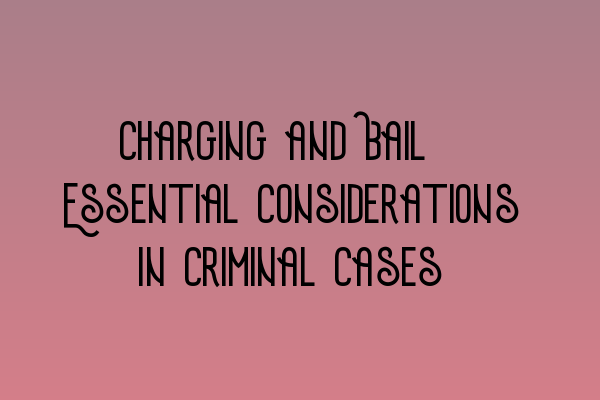Charging and Bail: Essential Considerations in Criminal Cases
Welcome to SQE Criminal Law & Practice Law UK’s blog post series! In this edition, we will be discussing the important aspects of charging and bail in criminal cases. Understanding these considerations is essential for both solicitors and individuals involved in the criminal justice system.
What is Charging?
Charging refers to the formal allegation of a crime against an individual. It is an important step in the criminal justice process that sets the stage for further legal proceedings. The charging decision is typically made by the police or prosecuting authorities, based on the evidence and circumstances of the case.
In order to establish a strong defense for the accused, solicitors need to have a comprehensive understanding of the specific legislation and common law principles relevant to the offense charged. This is where our SQE 1 Practice Exam Questions resource comes in handy. It provides valuable practice questions that can help solicitors enhance their knowledge and expertise in criminal law.
Considerations for Bail
Once an individual is charged, the question of whether they should be released on bail or remanded in custody arises. Bail is the temporary release of an accused person awaiting trial, subject to certain conditions. Determining whether bail should be granted involves careful consideration of various factors, including:
- The seriousness of the offense
- The likelihood of the accused absconding
- The potential risk to the public or witnesses
- The accused’s previous criminal history
- The strength of the evidence against the accused
To gain a deeper understanding of the complexities surrounding bail decisions, our SQE 2 Preparation Courses provide comprehensive study materials and expert guidance. These courses equip solicitors with the knowledge and skills needed to navigate the bail process effectively, ensuring the best possible outcome for their clients.
The Role of the Solicitor
Solicitors play a critical role in the charging and bail process. They represent the interests of their clients throughout the proceedings, ensuring that their legal rights are protected. Solicitors closely examine the evidence against their clients, challenge any irregularities, and advocate for bail whenever appropriate.
To enhance your preparation for the role of a solicitor in criminal cases, we recommend exploring our SQE 1 Preparation Courses. These courses cover all the necessary topics, including criminal law, procedure, and evidence, empowering aspiring solicitors with the knowledge they need to excel in their future legal careers.
Stay Up to Date with SQE Exam Dates
Keeping yourself informed about important exam dates is crucial when preparing for the SQE exams. The SRA SQE Exam Dates article provides an up-to-date schedule of forthcoming exams, ensuring that you have ample time to plan and prepare accordingly. Be confident in your exam readiness by utilizing our SQE 1 Practice Mocks FLK1 FLK2, which simulate the real exam experience and help you identify areas for improvement.
As solicitors, it is essential to stay up-to-date and continuously improve your knowledge and skills. By exploring our related articles and courses, you can bolster your expertise and enhance your overall performance in criminal law cases.
Thank you for reading our blog post on the essential considerations of charging and bail in criminal cases. Stay tuned for more informative content from SQE Criminal Law & Practice Law UK!
Related Articles:
- SQE 1 Practice Exam Questions
- SQE 1 Practice Mocks FLK1 FLK2
- SQE 2 Preparation Courses
- SQE 1 Preparation Courses
- SRA SQE Exam Dates
